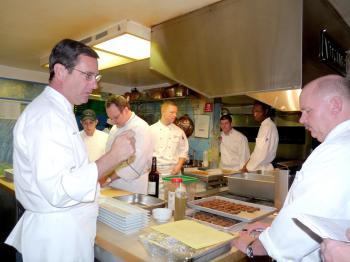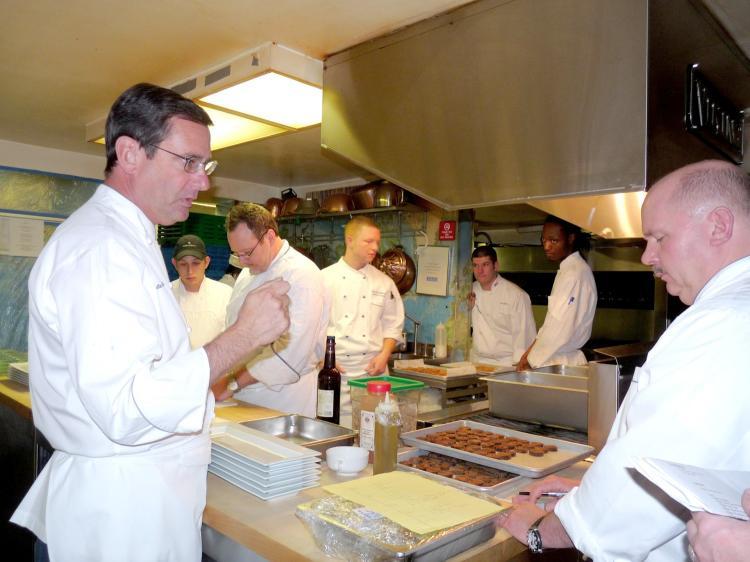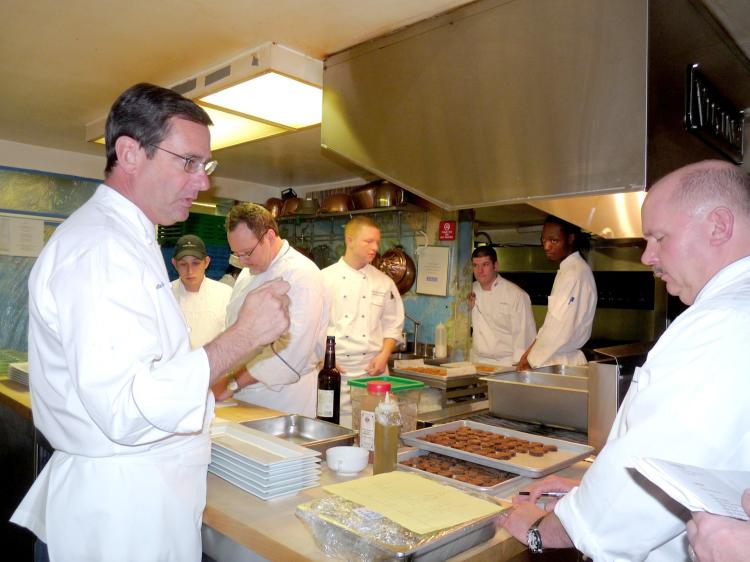Inauguration celebrations started early at the James Beard House on New York’s Greenwich Village. Walter Scheib, an acclaimed chef and former White House chef, prepared a White House Dinner on Jan. 15 in celebration of the inauguration of the nation’s 44th president. He was joined by a small group of chefs from Hershey’s Entertainment and Resorts Company.
The setting, the Beard House, which belonged to the legendary culinary icon, James Beard, is easy to walk by and miss. The foundation established in his honor there allows the world’s best chefs to showcase their talents by preparing meals for its members.
As you walk in, you immediately feel the vibe and the energy—the place is filled with history, but also warm and cozy. I had to walk up the narrow spiral staircase to the fourth floor to meet with Scheib, an energetic, down-to-earth gentleman with a sense of humor.
As Scheib settled into his chair, he gave me his honest opinion about his time in the White House. Scheib was the chef there for 11 years and two former presidents—Clinton and George W. Bush.
“Working at the White House sounds very glamorous and glorious, but in many respects, it is like being in a jail,” said Scheib. “The big federal facility is surrounded by high stone walls, iron fences, high security with guns, ID badges, and dogs. The security clearance is top-secret, everything you do is nobody’s business, and you have to keep it to yourself.”
Scheib compares his time there to a personal and professional “deep freeze”. But today, like a bird let out from its cage, Scheib is making the most of his freedom in his post-White House life. Among other ventures, he founded a company and published a book called The American Chef to share his experiences with the public.
“Now that I am on the outside, I can go around the country and talk to people who are interesting and interested in my stories and my food,” says Scheib.
Strange Request
Scheib says he had some strange requests and amazing experiences while at the White House. According to him, the Clintons loved school reunions of all kinds. One incident happened during a middle and elementary school reunion. The strangest request came from the Clinton’s state, Arkansas.
“An older women who had worked for the Clintons told me that if we are to cook for the Arkansans, we must cook food they liked—Fried Bologna Tra La La,” recalls Scheib. “I have been in the business for 35 years, but this was new to me.”
The recipe, which the woman told Scheib how to make, involves taking a loaf of bologna, skinning it, then cutting it into one-inch thick slices. The center is then carved out to make a bologna doughnut, and it is then put on the grill to fry with an egg in the center. It is fried on both sides and served with mustard on the side.
“I had to cook 1,200 of these and was very nervous, but we did it!” says Scheib. “The guests were very happy to see the Tra La La and they ate every single piece of that stuff.” Mr. Scheib thinks his resume is more unique now that it could include a line saying, “Holds the Guinness World Record for most Fried Bologna Tra La La ever made.”
A Unique Experience
Scheib’s most unique experience was to cook for and meet Nelson Mandela. Mandela was imprisoned in South Africa for 27 years.
“He went to jail for the things we all believe in,” says Scheib of Mandela.
During his visit, Mandela asked to meet with White House staff who told them that he relates to them more than politicians.
“Here is man who spent so much time in jail and you would expect him to be bitter, but instead [he was] saint-like, forgiving, tranquil and not a bitter man,” says Scheib, who adds that he still gets goose bumps when he talks about Mandela.
“Here is a saint on earth saying that you guys are as valuable as any of them at the top,” says Scheib.
Scheib’s Philosophy and Memories
Scheib’s philosophy about food and the experiences related to it play a keen role in the work he does.
“Unlike any other art, food fuels the body,” says Scheib. “One can look at a picture or listen to music, but in the end, you have to eat. Not only that, but the experiences and memories that are around the food make the whole experience. The actual meal may not be remembered—the conversations, scenery, music, sunset, sounds of nature, and conversations are what really makes it.”
But when it comes to talking shop,even at the White House, he says what’s on the table always takes center stage.
“Politics divide but the table unites—you can argue all you want but when you put out a good meal all the arguments stop,” says Scheib.
One of Scheib’s memories is of driving in the hills of Portofino, Italy on an early Sunday evening high up in the mountains. When plans to eat at a local restaurant were thwarted, he and his companions found an unlikely solution.
“We asked if we could eat what the family was eating,” recalls Scheib, and they were told yes. “It was pasta, lasagna, swimming in an emerald-green pool, we drank and ate with them. It was the best time, at the end of the evening I asked for a bill. They said to me, ‘We should pay you to eat it!’”
To Scheib, his Italian experience sums up his philosophy about dining.
“That is what dining is—it has to have an adventure—to get out, meet people, go places where people have not been to in many years,” he says. “There is no point in it if you are just a spectator. You want to be in the game. You get more fun being in the game. Try to be part of it and meet the people and know the people.”
Whether in the White House or involved in his current work traveling, lecturing, and guest-cooking, Scheib says that food is universal.
“The emotional component of food and dining transcends politics, transcends national differences and cultural differences,” says Scheib.
Walter Scheib is founder of The American Chef, a partner in the Culinary Division of the Hershey Entertainment and Resorts Company, and author of The White House Chef. Part II of the interview with Scheib will be published on Jan. 29.






